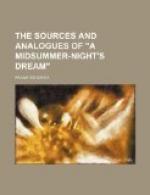But listen, and I shall you tell
A chance in Fairy that befell,
Which certainly may please some well
In love and arms
delighting,
Of Oberon that jealous grew
Of one of his own Fairy crew,
Too well, he feared, his Queen that knew
His love but ill
requiting.
Pigwiggen[4] was this Fairy Knight,
One wondrous gracious in the sight
Of fair Queen Mab, which day and night
He amorously observed;
Which made King Oberon suspect
His service took too good effect,
His sauciness and often checkt,
And could have
wished him starved[5].
Pigwiggen gladly would commend
Some token to Queen Mab to send,
If sea or land him aught could lend
Were worthy of
her wearing;
At length this lover doth devise
A bracelet made of emmets’ eyes,
A thing he thought that she would prize,
No whit her state
impairing.
And to the Queen a letter writes,
Which he most curiously indites,
Conjuring her by all the rites
Of love, she would
be pleased
To meet him, her true servant, where
They might, without suspect or fear,
Themselves to one another clear
And have their
poor hearts eased.
“At midnight the appointed hour,
And for the Queen a fitting bower,”
Quoth he, “is that fair cowslip
flower
On Hipcut hill
that bloweth;
In all your train there’s not a
fay
That ever went to gather may
But she hath made it, in her way;
The tallest there
that groweth.”
When by Tom Thumb, a Fairy Page,
He sent it, and doth him engage
By promise of a mighty wage
It secretly to
carry;
Which done, the Queen her maids doth call,
And bids them to be ready all:
She would go see her summer hall,
She could no longer
tarry.
Her chariot ready straight is made,
Each thing therein is fitting laid,
That she by nothing might be stayed,
For naught must
be her letting;
Four nimble gnats the horses were,
Their harnesses of gossamere,
Fly Cranion her charioteer
Upon the coach-box
getting.
Her chariot of a snail’s fine shell,
Which for the colours did excel,
The fair Queen Mab becoming well,
So lively was
the limning;
The seat the soft wool of the bee,
The cover, gallantly to see,
The wing of a pied butterflee;
I trow ’twas
simple trimming.
The wheels composed of crickets’
bones,
And daintily made for the nonce;
For fear of rattling on the stones
With thistle-down
they shod it;
For all her maidens much did fear
If Oberon had chanced to hear
That Mab his Queen should have been there,
He would not have
abode it.
She mounts her chariot with a trice,
Nor would she stay for no advice,
Until her maids that were so nice
To wait on her
were fitted;
But ran herself away alone,
Which when they heard, there was not one
But hasted after to be gone,
As she had been
diswitted.




